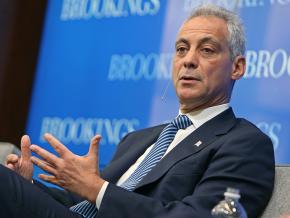Illinois Republocrats pass a school voucher bill
Chicago Teachers Union member looks at the rotten "compromise" behind a broadly celebrated education bill that just became law in the state of Illinois.
CHICAGO'S DEMOCRATIC Mayor Rahm Emanuel teamed up with Illinois' Republican Gov. Bruce Rauner and state legislators from both parties to help pass Senate Bill (SB) 1947, a school-funding bill that creates a voucher system for the state. Rauner signed the bill into law on September 1.
Passage of SB 1947 comes after more than two years of political wrangling, largely due to the governor's obsession with destroying unions, that until recently left the state without a budget.
Politicians of all stripes are patting themselves on the back. Emanuel is claiming victory because Rauner backed down on some of his worst proposals. Chicago Public Schools (CPS) supposedly got all the money it was slated to get "and more," according to Emanuel. "It's a historic moment because we are finally fixing a historic wrong."
The Chicago Tribune considers this legislation the greatest accomplishment of Rauner's first term, suggesting that its passage will position him to run for a second term as "the education governor."

The bill establishes a new school-funding formula that moves in the direction of more adequate and equitable funding--at least in theory. Illinois currently spends a lower percentage of its state budget on education than any other state in the country. It also has one of the most unequal school systems in the country--roughly $8,000 spent per student annually in the poorest school districts versus $30,000 in the richest.
The new funding formula aims to address some of these disparities. However, there is no plan to generate the revenue needed to fully fund the formula. "To meet the terms of the new formula, the state should be putting roughly $5 billion in new revenue into statewide public education coffers, yet the new bill only provides $350 million in new revenue overall," according to the Chicago Teachers Union (CTU).
ARGUABLY, THE worst feature of the law is the introduction of school vouchers. The law provides $75 million in tax breaks for corporations or individuals who donate up to $1 million to a voucher program. This is effectively taking state money that should be for public schools and using it to subsidize non-union private schools.
Supporters of vouchers, like Education Secretary Betsy DeVos, claim that they provide better educational opportunities for low-income and minority students. But in states that have a voucher program, the majority of voucher applicants are often students who already attend private schools.
Vouchers are never enough to cover the full cost of tuition at a private school--they amount to a discount to families, many of whom already have the means to send their children to private schools. The private schools that receive this subsidy aren't held accountable by any of the laws that govern public education, including anti-discrimination laws.
A significant number of voucher-receiving schools in North Carolina, for example, prohibit the enrollment of LGBT students. Studies by the Brookings Institute and the Education Research Alliance for New Orleans found that school vouchers actually lowered academic achievement on average for voucher recipients in Indiana and Louisiana.
SB 1947, in addition to creating a voucher system, would allow private outsourcing of physical education and drivers' education teachers in public schools.
To sum it up, we have an unfunded mandate for more equal school funding combined with accelerated privatization--dubbed a "great compromise," according to the majority of our political establishment.
It has even been sanctified by Chicago Archdiocese Cardinal Blase Cupich, who claims that he taught Rauner and Democratic state House Speaker Mike Madigan to "trust each other"--with the added benefit of funneling public money into Catholic schools.
THIS IS not a solution to our problems.
CPS, the largest school district in the state and also one of the neediest, has endured $2 billion in budget cuts over the last five years and is currently facing a $250 million budget shortfall. The additional funding made available under the new law will not be enough to solve CPS's budget woes.
And the bill, while doing nothing to stop corruption and mismanagement of funds, may actually accelerate these trends.
"The three biggest cost drivers to the continuing CPS deficit are unchecked privatization and charter proliferation, unfunded pension liabilities, and debt service," according to CTU Vice President Jesse Sharkey. "Debt service alone has increased 70 percent under Mayor Rahm Emanuel's leadership since 2011, from $332 million a year to more than a half billion dollars, and this year's CPS budget contains nearly $100 million in interest on its short-term line of credit."
For the last six years, CTU leadership has been pushing for a package of reforms to generate revenue and to create a public school system that is actually accountable to the public.
A financial transaction tax amounting to one-hundredth of 1 percent on each transaction could generate up to $15 billion of additional state revenue every year, and an elected school board in Chicago would create at least some measure of public accountability. Politicians of both parties have consistently ignored, downplayed or sidelined these proposals from the CTU.
We need to tax the rich. Instead, we allow bankers to bleed our school system. Chicago teachers struck in 2012, and again for one day in 2016, together with other public-sector unions, in order to put the issue of revenue front and center. It will take mobilizing this kind of power, but on a larger scale, to secure the kind of school system that Illinois schoolchildren deserve.


